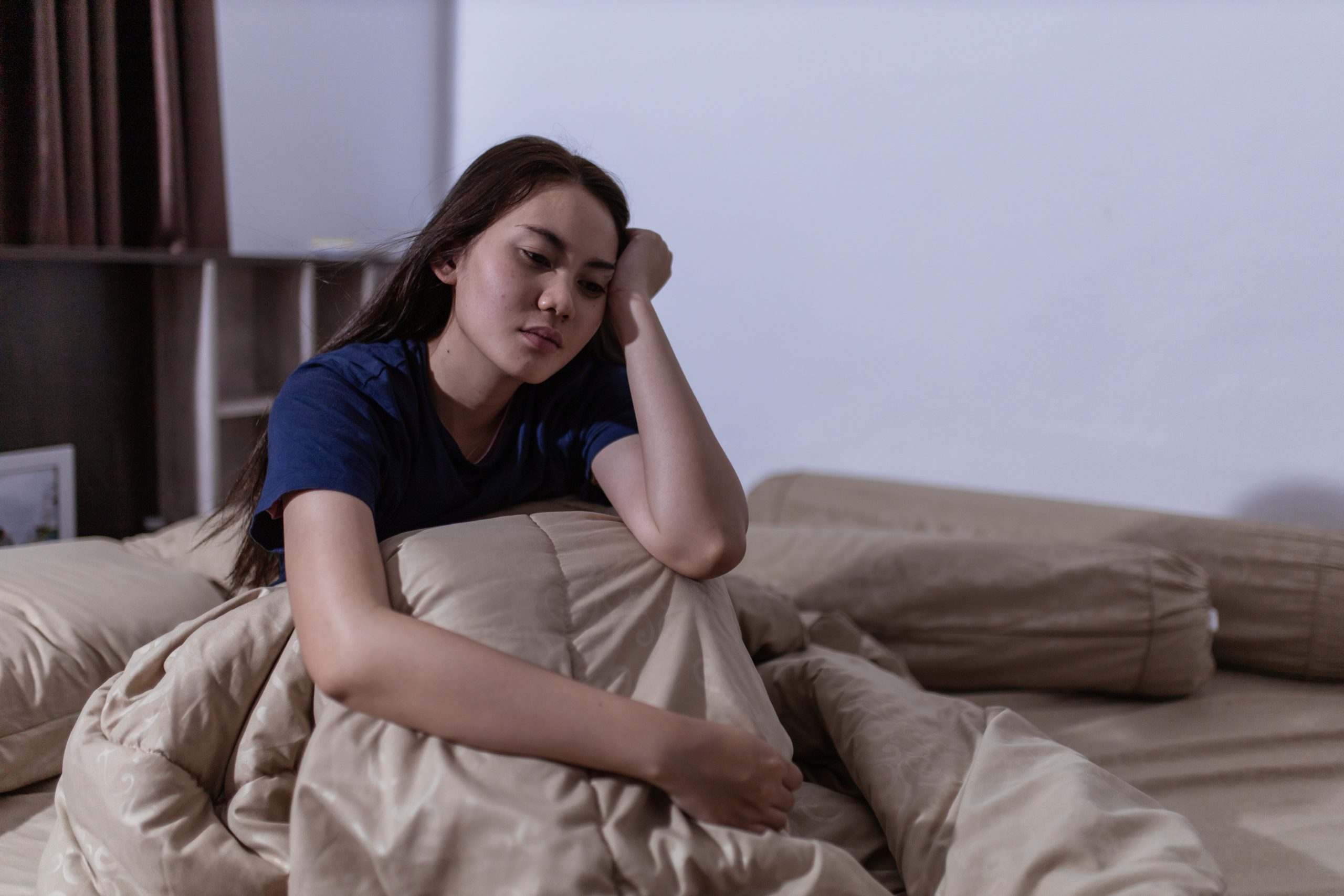
We’ve all had those days, running on fumes, feeling emotionally fragile, snapping at people we love, and wondering what is wrong with me? The truth is, many women are juggling a lot: careers, relationships, caregiving, and the mental load of daily life. Sleep often becomes the first thing we sacrifice to get it all done. But understanding how sleep affects mental health might be the wake-up call we didn’t know we needed.
In this post, we’ll explore the powerful connection between sleep and emotional well-being, how quality rest can ease anxiety, boost mood, and support overall mental clarity. Whether you're dealing with stress, burnout, or just feel “off,” this blog breaks down the science in a way that makes sense. Plus, there's a simple checklist at the end to help you build better sleep habits starting tonight.
The Science Behind How Sleep Affects Mental Health
When you sleep, your brain isn’t just resting, it’s actively working to process emotions, store memories, and regulate your mood. During deep sleep and REM cycles, your brain filters through emotional experiences and helps you respond more calmly and clearly to stress the next day. That’s why even one restless night can leave you feeling irritable, anxious, or mentally foggy. Understanding how sleep affects mental health starts with recognizing that rest is not a luxury—it’s a foundational part of emotional stability.
Chronic sleep deprivation, on the other hand, can heighten symptoms of anxiety and depression, and even make it harder for your brain to cope with everyday stressors. Studies have shown that people who don’t get enough quality sleep are more likely to experience mood disorders, while those who improve their sleep often see real mental health benefits. In short: getting better sleep isn't just about feeling less tired, it’s about giving your brain the reset it needs to function at its best.
Quality sleep isn’t just about how long you sleep, it’s about how well you sleep. True rest means your sleep is deep, uninterrupted, and leaves you feeling refreshed when you wake up.
Some common signs that your sleep quality may be poor include:
- Difficulty falling asleep
- Waking up multiple times during the night
- Still feeling tired or groggy even after a full night’s sleep
The Benefits of Good Sleep Go Beyond Feeling Rested
Getting consistent, high-quality sleep is one of the best things you can do for both your mind and body. It boosts your energy, helps you manage stress, and supports overall health in powerful ways.
Here are just some of the benefits of good sleep:
- Strengthens your immune system, so you get sick less often
- Helps you maintain a healthy weight
- Reduces stress and improves your mood
- Supports heart health and a balanced metabolism
- Restores emotional balance
- Boosts resilience and your ability to cope with stress
- Improves relationships and overall productivity
- Encourages self-compassion and helps prevent burnout
- Lowers your risk for chronic conditions, including:
- Type 2 diabetes
- Heart disease
- High blood pressure
- Stroke
- Sharpens attention, focus, and memory to help you better manage daily tasks
Sleep isn’t just rest, it’s repair, protection, and preparation for the day ahead.
Warning Signs: When Poor Sleep Is Hurting Your Mental Health
It’s easy to dismiss a few rough nights as just part of a busy season, but when sleeplessness becomes consistent, the effects on your mental health can quietly build. You might find yourself more irritable, anxious, or emotionally sensitive than usual. Maybe it’s harder to concentrate at work, or you’re forgetting little things that never used to slip your mind. These changes are real examples of how sleep affects mental health, and they’re often the first clues that your body and brain are running on empty.
Other signs can be more subtle but just as impactful, like persistent cravings for sugar or carbs, a sudden lack of motivation, or pulling away from social plans you’d normally enjoy. Sleep deprivation disrupts the delicate chemical balance in the brain, which plays a major role in mood regulation, decision-making, and emotional resilience. Left unchecked, poor sleep can make even manageable stressors feel overwhelming, creating a loop that's hard to break without rest and recovery.
For some women, getting quality sleep isn’t just a matter of good habits, it’s a medical issue. Certain health conditions, known as sleep disorders, can make it difficult to get the rest your body and mind need, no matter how hard you try.
Some common sleep disorders include:
- Insomnia (trouble falling or staying asleep)
- Restless legs syndrome (an uncontrollable urge to move your legs, especially at night)
- Narcolepsy (sudden, uncontrollable sleep episodes)
- Sleep apnea (disrupted breathing during sleep)
If you’re consistently struggling with sleep or noticing symptoms of a possible disorder, it’s important to talk to your healthcare provider. They may recommend testing, such as a sleep study, to find out what’s going on and help you get back to better rest.
Why Women May Feel the Impact of Poor Sleep More Deeply
Women often carry a heavier mental load, from balancing careers and family responsibilities to managing hormonal shifts that can directly impact sleep quality. Whether it’s waking up with a crying baby, lying awake thinking through tomorrow’s to-do list, or navigating perimenopause and hot flashes, uninterrupted rest can feel like a luxury. But when sleep suffers, so does mental health, and women are statistically more likely to experience anxiety, depression, and insomnia. These patterns reveal just how sleep affects mental health, especially for women juggling it all.
Hormonal fluctuations throughout the menstrual cycle, pregnancy, and menopause also play a major role in both sleep patterns and emotional regulation. Add in the societal pressure to “keep it together” and always be productive, and it’s no wonder so many women are running on empty. Understanding this connection isn’t about placing blame, it’s about giving yourself permission to prioritize rest, knowing it’s essential to both your emotional and physical well-being.
Why Sleep Matters in Active Recovery
For women in active recovery from substance abuse, quality sleep isn’t just helpful, it’s essential. The body and brain go through intense healing during early recovery, and restful sleep supports that process on every level. Research shows that poor sleep can increase cravings, heighten emotional sensitivity, and make it harder to manage stress. Prioritizing consistent, restorative rest helps stabilize mood, improve decision-making, and build the resilience needed to stay committed to recovery. For women reclaiming their lives, sleep is a powerful form of self-care and a foundational tool for long-term healing.
Checklist: Simple Habits for Better Sleep and a Healthier Mind
Improving your sleep doesn’t have to mean overhauling your entire routine. Small, consistent changes can make a big difference in how well you rest, and how you feel mentally and emotionally. Use this checklist to build healthier sleep habits and create a bedtime routine that supports your mental well-being:
- Stick to a consistent sleep schedule: Go to bed and wake up at the same time every day, even on weekends.
- Create a relaxing bedtime routine: Wind down with calming activities like reading, stretching, or deep breathing—avoid screens and stressful conversations.
- Limit caffeine and alcohol: Avoid both in the hours leading up to bedtime, as they can disrupt your sleep quality.
- Make your sleep space comfortable: Keep your bedroom cool, dark, and quiet. Invest in cozy bedding and remove distractions like bright lights or noisy devices.
- Get natural light during the day: Exposure to daylight helps regulate your sleep-wake cycle, so try to spend time outside or near a window.
- Move your body regularly: Daily physical activity, even a walk, can help you fall asleep faster and sleep more deeply.
- Watch your screen time: Limit phone, tablet, and TV use at least 30–60 minutes before bed. Blue light can interfere with melatonin production.
- Write down your thoughts: If your mind races at night, try journaling or making a to-do list before bed to clear mental clutter.
- Talk to a healthcare provider if needed: If sleep problems persist, you may have an underlying sleep disorder, don't hesitate to seek support.
Rest Is Recovery: Prioritizing Sleep for Mental Wellness
When life gets overwhelming, sleep is often the first thing we sacrifice, but it should be one of the first things we protect. As we’ve seen, the science is clear: how sleep affects mental health is not just a theory, it’s a reality. Prioritizing rest helps regulate emotions, improves resilience, and supports both your physical and emotional healing.
At Twin Branch Wellness and Recovery for Women, we understand that true recovery is holistic, and sleep plays a vital role in that journey. Whether you're in active treatment, early recovery, or simply learning to care for yourself again, building healthy sleep habits can be a powerful step toward lasting wellness. You deserve rest, restoration, and support every step of the way.











